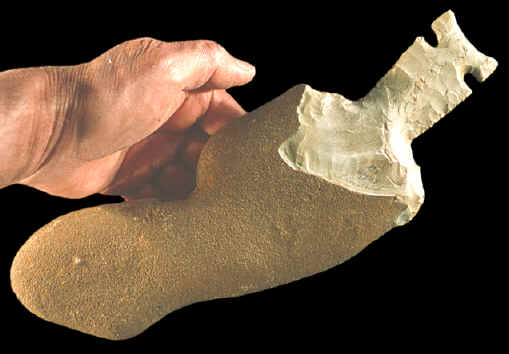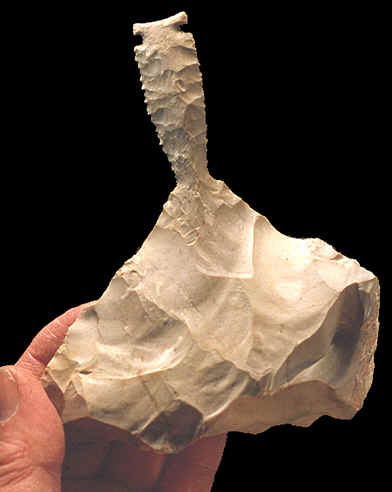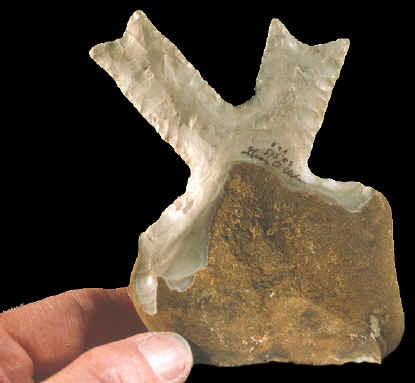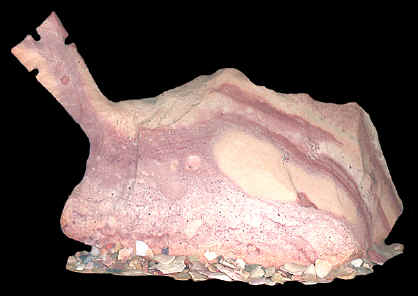|
"He (George Eklund) is renowned as the "fastest" knapper
at Fort Osage (knap-in), doing massive percussion on large pieces, but
he is also capable of fine pressure work".---2004,
John C. Whittaker, "American Flintknappers," p. 76.
"For awhile he (George Eklund) made points only partly knapped from
a large flake, still attached as if growing out of the stone".---2004,
John C. Whittaker, "American Flintknappers," p. 76.
"His
work shows a wide range of talent and creativity".---2005,
"Modern Lithic Artists Journal," Vol. 1, p. 29.

GEORGE EKLUND'S
STONE ART
George Eklund is a commercial knapper from Grove Oklahoma. He started flintknapping
when he was a teenager and has been breaking rocks for 40 years now. One
of the things he has become famous for is his ability to finish points
very quickly. John Whittaker writes; "He is renowned as the
"fastest" knapper at Fort Osage (a famous knap-in site)."
|
|

CLICK ON
PICTURE FOR A LARGER IMAGE
NODULAR
ART FORM BY GEORGE EKLUND
DONNIE McKINNIS
COLLECTION
This large side-notched point is emerging from a chert nodule that
was collected by George Eklund, near Jefferson City, Missouri. It
represents a very good example of this type of "nodular
art." |
|
|
George
Eklund is also famous for his use of copper billets (hammer used for
striking off percussion flakes). In fact he is credited as the first, or
one of the first, to have introduced copper striking tools for
flintknapping. He is believed to be one of the first to have invented
the copper billet.
|
|

CLICK ON
PICTURE FOR A LARGER IMAGE
ART PIECE BY GEORGE EKLUND
This well made side-notched point is emerging from a chert flake.
This piece measures 5 1/2 inches (14 cm) tall and it represents a
good example of George Eklund's art forms in stone. |
|
|
One
of George Eklund's signature points are his nodular art pieces that he
makes from nodules and large chert flakes. Various types of points
appear to be growing or emerging from the stone. John
Whittaker writes: "still attached as if growing out of the
stone."
|
|

A GEORGE EKLUND
NODULAR ART PIECE
DONNIE McKINNIS
COLLECTION
These two Dalton points seem to be growing out of a small chert
nodule. It represents another of George Eklund's unique
art. |
|
|
One
other art form that George Eklund has made are his "as found"
frames. These rustic frames have soil, grass and sticks for
a background along with a nicely knapped point laying on top. The
scene gives the viewer the appearance of a new surface find.
|
|

ART PIECE BY GEORGE
EKLUND
This large unfinished Cahokia point is still attached to a
particularly colorful piece of Burlington chert. Several small
flakes have been glued around the bottom. This is the smallest of
the four pieces illustrated in this article. It measures 2 1/2
inches (6.3 cm) tall and 4 1/4 inches (10.7 cm) wide. |
|
|
As more and more
flintknappers experiment with basic flintknapping techniques we can
expect to see more new and unique examples of lithic art. George Eklund's nodular art
represents one of these new styles. One thing is
for sure, prehistoric knappers were not making nodular art forms like
the ones illustrated here, at least none that we know of.
|
|
"REFERENCES"
2004,
Whittaker, John C., "American Flintknappers," George Eklund,
Commercial Knapper, pp. 76-77.
2005, "Modern Lithic Artists Journal, Vol. 1, Artist,
George Eklund, p. 29.
Personal communications with Donnie McKinnis.
|
|
RECENT
LISTINGS HOME
ORDERING |